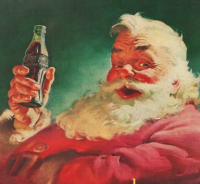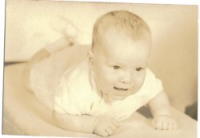 Recently I woke from troubled dreams to find myself with white hair, a long beard, and a troubling impact on small children.
Recently I woke from troubled dreams to find myself with white hair, a long beard, and a troubling impact on small children.
Little kids would look up at me, wide-eyed.
Their faces held a mixture of awe and fear.
I knew what they were thinking.
I gathered some of them together and told them a story.
 Once upon a time, I said, there was a little boy. The world was new to him, and his parents were still a mystery.
Once upon a time, I said, there was a little boy. The world was new to him, and his parents were still a mystery.
His mother would discipline him, and he would cry, “I want daddy!”
His father would discipline him, and he would cry, “I want mommy!”
Then both parents would discipline him, and he would cry, “I want Santa Claus!”
Santa Claus would save him, the little boy thought. Santa Claus had a naughty list, but the little boy knew a secret. There are no truly naughty boys and girls. There are just boys and girls who make mistakes, mistakes they are anxious to correct, because they are new to the world. Children are containers for wishes and dreams.

Santa Claus was not judgmental. Santa Claus didn’t criticize how children played with their toys. Santa Claus knew that play is how children learn. Playing is how they learn to manage the world, and it’s how they learn what they want to do with their lives.
One year, Santa Claus brought the little boy a typewriter for Christmas. What a strange toy, the boy thought. He began to tap the keys, and words came out onto paper.

The boy became a man who loved words. In times of sorrow they would comfort him. When he was confused, words would explain away the confusion.
Through Santa’s gift, the little boy became a strong, confident man. A beautiful young woman was attracted to him. Work came their way. Now, the man and the woman had a home, they both had interesting work to do, and soon they had children, who asked the Santa question anew.
Is there really a Santa Claus, one asked?

It’s true. Your parents give you those presents at Christmas, he wrote. We guess at what you want, and we give you what we can. It is a parent’s privilege to do this.
There are children without parents, children whose parents can’t or won’t provide them with presents. These children, too, usually get a Christmas, because men and women touched by the story of Santa Claus often find ways to get gifts to them. Causes that can help children or uplift them also get gifts and pass them around.
We have a word for this. We call it philanthropy.
Now that you know this, the man concluded to his daughter, you can become Santa Claus. Be a good one.

This filled the old man with a strange sensation. He now felt his life had meaning. He had been given a great gift, and was now prepared to give in return, not only to his own family but to all the children he might meet.
We have a word for this feeling.
We call it happiness.
When I finished telling the story I looked each child before me. Our eyes met. I then realized the secret meaning of my story. I decided to share it with them.
It took me only a moment to say it, and my voice broke as I spoke.
I am Santa Claus, I said.










